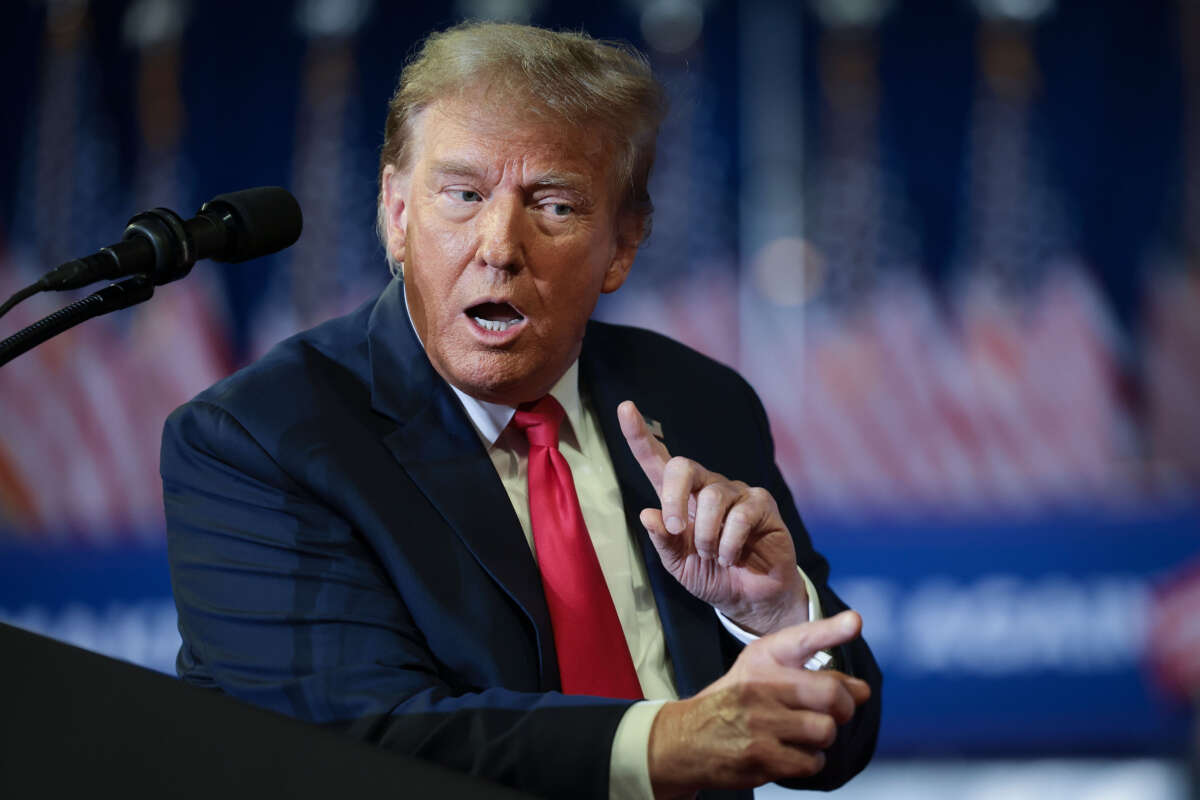Did you know that Truthout is a nonprofit and independently funded by readers like you? If you value what we do, please support our work with a donation.
Lawyers for former President Donald Trump filed a brief to the U.S. Supreme Court asking for a stay of a recent appellate court ruling against his “presidential immunity” claims in his election subversion case.
Trump faces four federal charges in the case relating to his efforts to overturn the 2020 presidential election and his actions on January 6, 2021, when a mob of his loyalists attacked the U.S. Capitol building. Trump has asserted that he cannot be charged at all by Department of Justice (DOJ) special counsel Jack Smith, claiming that his actions were part of his presidential duties and that former presidents cannot be charged after leaving the White House for their actions in office, even if those actions are criminal.
Last week, the U.S. Circuit Court of Appeals for the District of Columbia rejected those arguments, including the assertion by Trump’s legal team that criminal charges after leaving office would stymie future presidents from carrying out their official duties.
“We cannot presume that a President will be unduly cowed by the prospect of post-Presidency criminal liability any more than a juror would be influenced by the prospect of post-deliberation criminal liability, or an executive aide would be quieted by the prospect of the disclosure of communications in a criminal prosecution,” the appeals court stated in its order.
Trump’s latest filing to the Supreme Court, submitted on Monday, seeks to place a hold on the appellate court order while a more formal writ of certiorari (request of the Court to hear an appeal) is drafted. Until the Supreme Court decides what to do with the request, the case, which was scheduled to begin the trial phase in early March, is on indefinite hold.
Chief Justice John Roberts, who oversees such requests from the D.C. Circuit Court, could decide to place a hold on the order himself. He could also request the full Supreme Court to weigh in on the matter, and issue an order responding to the request in that manner. The Court could accept the brief and place a stay, or reject it outright and let the lower court’s order stand, which would allow the pre-trial phase of his case to move forward. For now, the Supreme Court has given Smith a week to respond to Trump’s filing, a faster-than-usual deadline that may indicate that the justices want to resolve the matter in a timely way.
Trump’s filing states that his immunity claims are “a novel, complex, and momentous question that warrants careful consideration on appeal.” It continues to press his questionable view that presidents must be immune from criminal prosecution after leaving office.
“Without immunity from criminal prosecution, the Presidency as we know it will cease to exist,” the brief warns.
Several legal minds have doubted this line of reasoning, noting that it could mean that a sitting president could engage in numerous criminal actions (such as assassinating a political rival, for example) without repercussions if they have an agreeable Congress that refused to impeach them — a point that was brought up during the appellate court hearing itself.
Former White House attorney for Trump Ty Cobb is among those who read this latest filing for Trump and found it lackluster.
“It’s repetitive of their briefs below which, the arguments that they presented were not only soundly rejected, but eviscerated both in oral argument and in the opinion,” Cobb said on CNN Monday evening. “I don’t think the Supreme Court is going to find those arguments compelling in any way.”
“The Supreme Court is most likely either to deny the request for a stay or to treat the application as a petition for certiorari (appeal) as well, grant a stay and grant cert, and set a quick timeline for briefing and arguments,” said Chris Geidner writing at Law Dork, a legal reporting and analysis publication.
Press freedom is under attack
As Trump cracks down on political speech, independent media is increasingly necessary.
Truthout produces reporting you won’t see in the mainstream: journalism from the frontlines of global conflict, interviews with grassroots movement leaders, high-quality legal analysis and more.
Our work is possible thanks to reader support. Help Truthout catalyze change and social justice — make a tax-deductible monthly or one-time donation today.
